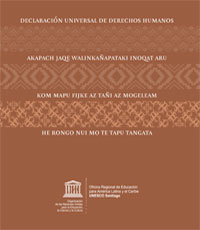Universal Declaration of Human Rights (in Spanish, Aymara, Mapudungun and Rapa Nui)

- © UNESCO
For more than half a century, the Universal Declaration of Human Rights has been the main yardstick on the theme of rights. All principles that announce fundamental rights and freedoms are contained in the text of the Declaration. Every reference to the defence and promotion of the rights of individuals and their fundamental freedoms as a necessary condition for peace, understanding and development, begins with a reference to this all-important, non-binding instrument of our time, which has been translated into more than 330 languages.
Adopted and proclaimed by Resolution number 217 A (iii) of the United Nations General Assembly on 10 December 1948, the Assembly called upon all Member countries to publicise the text of the Declaration and "to cause it to be disseminated, displayed, read and expounded principally in schools and other educational institutions, without distinction based on the political status of countries or territories." The General Assembly proclaims the Declaration as a common standard of achievement for all peoples and all nations, to the end that every individual and every organ of society, keeping this Declaration constantly in mind, shall strive by teaching and education to promote respect for these rights and freedoms.
This has been UNESCO’s inspiration right from the start. Its Constitution establishes that only a culture of rights can guarantee a comprehensive culture of peace. This publication is also an invitation to value the richness of linguistic diversity 60 years after the universal declaration of human rights of our societies, especially that of the indigenous peoples of Chile. On the occasion of celebrating the International Year of Languages, the Director General of UNESCO Köichiro Matsuura expressed that "languages lie at the heart of all social, economic and cultural life." For this reason, UNESCO has wished to honour the original languages of Chile by translating the Universal Declaration of Human Rights into Aymara, Mapudungun and Rapa Nui.
Download the PDF document (in Spanish, Aymara, Mapudungun and Rapa Nui)
- Author(s): UNESCO
- Publication Date: 28-01-2009


